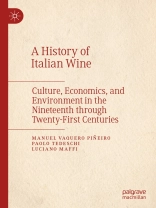This book analyzes the evolution of Italian viticulture and winemaking from the 1860s to the new Millennium. During this period the Italian wine sector experienced a profound modernization, renovating itself and adapting its products to international trends, progressively building the current excellent reputation of Italian wine in the world market.
Using unpublished sources and a vast bibliography, authors highlight the main factors favoring this evolution: public institutional support to viticulture; the birth and the growth of Italian wine entrepreneurship; the improvement in quality of the winemaking processes; the increasing relevance of viticulture and winemaking in Italian agricultural production and export; and the emergence of wine as a cultural product.
สารบัญ
1. Why a Comprehensive History of the Italian Wine?.- 2. Institutional Innovation and Public Policies.- 3. Winemakers.- 4. Production, Trade, and Consumption.- 5. Italy Tasting: Wine, Tourism, and Landscape.
เกี่ยวกับผู้แต่ง
Manuel Vaquero Piñeiro is Associate Professor in Economic History at the University of Perugia, Italy. He studies Economic and Social History, with particular attention to agriculture in late-nineteenth-century Italy.
Paolo Tedeschi is full Professor in Economic History at the University of Milano-Bicocca, Italy. His studies focus on Italian Economic History and the European integration process, in particular the evolution of the agricultural sector.
Luciano Maffi is a Lecturer in Economic History at the University of Parma, Italy. He studies agricultural and food production in Modern and Contemporary History, with a focus on viticulture and wine production.












